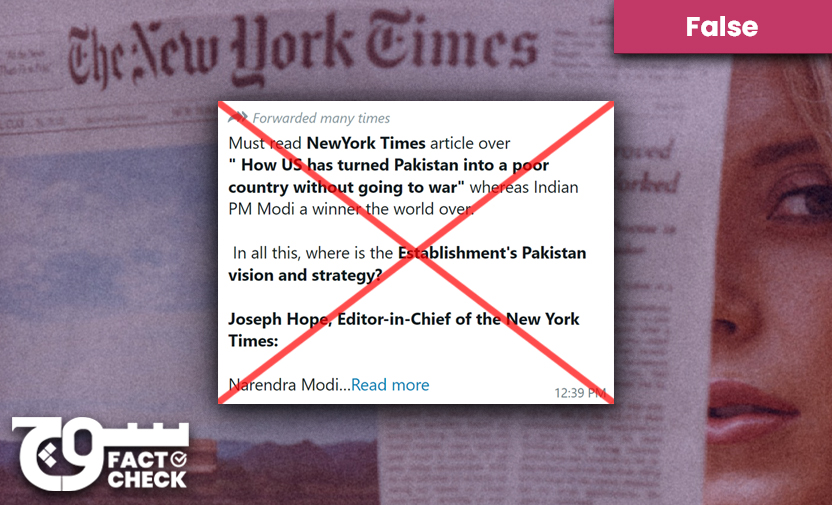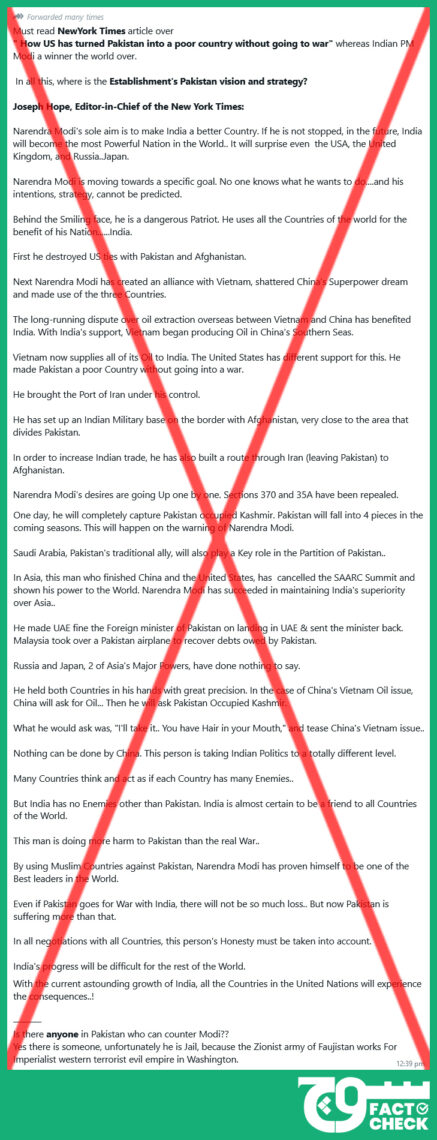
Claim: The New York Times recently published an article titled “How US has turned Pakistan into a poor country without going to war,” in which it questions where “the Establishment’s Pakistan vision and strategy” is and praises Indian Prime Minister Narendra Modi. The piece is written by NYT Editor-in-Chief Joseph Hope.
Fact: There is no evidence of such an article ever being published by The New York Times. In fact, the publication has denied producing this write-up and clarified that they have no employee by the name of Joseph Hope.
On 23 January 2024, Soch Fact Check received a forwarded chain message on WhatsApp, the initial portion of which is as follows:
“Must read NewYork Times article over
” How US has turned Pakistan into a poor country without going to war” whereas Indian PM Modi a winner the world over.
In all this, where is the Establishment’s Pakistan vision and strategy?
Joseph Hope, Editor-in-Chief of the New York Times:
Narendra Modi…”

The article dives into portraying a formidable image of Indian Prime Minister Narendra Modi whose “sole aim is to make India a better Country”. Modi, it goes on to say, is a “dangerous Patriot” who “destroyed US ties with Pakistan and Afghanistan”.
The write-up warns of India completely capturing “Pakistan occupied Kashmir” and how “Pakistan will fall into 4 pieces in the coming seasons”.
It ends with the following text:
“Is there anyone in Pakistan who can counter Modi?? Yes there is someone, unfortunately he is Jail, because the Zionist army of Faujistan works For Imperialist western terrorist evil empire in Washington.”
The person referred to in the phrase “there is someone, unfortunately he is Jail” is Pakistan’s former prime minister and chief of the Pakistan Tehreek-e-Insaf (PTI), Imran Khan.
Khan in trouble
Khan was arrested (archive) and imprisoned after a court ruled that his “dishonesty has been established beyond doubt” in the Toshakhana case. He was given a three-year jail sentence on 5 August 2023 — but maintains his innocence — and has since been incarcerated.
Reuters reported (archive) that the conviction was overturned on 29 August, but the former PM faces over 100 charges since his removal from power last year, according to the BBC (archive).
Khan’s party, the PTI, has alleged that the authorities are preventing its candidates from contesting the highly-anticipated upcoming 2024 polls. The Election Commission of Pakistan (ECP) on 30 December 2023 rejected (archive) Khan’s nomination papers as he was “convicted by the court of law” and on account of his “disqualification under the Constitution”.
The party’s electoral symbol, the cricket bat, symbolising Khan’s past as a cricketer, became a bone of contention ahead of the general elections and was taken away through a Supreme Court ruling (archive) on 13 January.
On 31 January, just days ahead of the 2024 general elections, an anti-corruption court handed a 14-year prison sentence each to Khan and his wife, Bushra Khan, popularly known as Bushra Bibi, “on charges of illegally selling state gifts”, Reuters reported (archive), citing his party.
The publication said this was “the third conviction for the embattled former prime minister”, one of which was announced a day prior when a special court sentenced (archive) him to 10 years in prison and the other — a three-year sentence announced in August 2023 — that was suspended over an appeal.
In the case about leaking “state secrets”, the former premier was accused of making public a “cypher,” or classified cable, sent by Pakistan’s ambassador to the US last year, that he claims “was proof of a conspiracy by the Pakistani military and U.S. government to topple his government in 2022 after he visited Moscow just before Russia’s invasion of Ukraine”.
The word “Faujistan” — a portmanteau of the Urdu word Fauj, or the army, and Pakistan — is used in the viral WhatsApp message in the context of how, according to Al Jazeera (archive), the military has “directly ruled over Pakistan for more than three decades of its 75-year existence as a constitutional republic and has controlled most levers of power, from behind the scenes, even when civilian governments have been in office”.
Khan has clashed (archive) with the Pakistan Army after levelling serious allegations against its current chief, General Syed Asim Munir, and his predecessor, Gen (r) Qamar Javed Bajwa, accusing (archive) the military boss of “dismantling the future of this country to protect himself”.
The Pakistan Army has rejected Khan’s accusations.
The past year has seen his party being dismantled, as thousands (archive) of his party supporters were arrested and hundreds of leaders have left (archive) the PTI.
Furthermore, the 2024 general elections, slated to be held on 8 February, have already become controversial (archive) after the rights watchdog Human Rights Commission of Pakistan (HRCP) alleged (archive) “blatant manipulation of the electoral landscape”, saying there is “little evidence to show that the upcoming elections will be free, fair or credible”.
At a press conference held in Islamabad earlier today, HRCP has said it is deeply concerned by the overall deterioration in human rights, which needs urgent attention as the new year unfolds.
Foremost is the blatant manipulation of the electoral landscape in which one political… pic.twitter.com/UltNU3PjS5
— Human Rights Commission of Pakistan (@HRCP87) January 1, 2024
According to an Al Jazeera article, “concerns are mounting among analysts and sections of the political class that the coming vote might rank near the top of the list of most manipulated votes even in the country’s chequered democratic journey”.
The piece goes on to say, “Critics point to the crackdown by state authorities against Pakistan Tehreek-e-Insaf (PTI) and its charismatic leader, Imran Khan, as evidence of widespread rigging that could deny the former prime minister and his party a shot at a fair contest.”
Fact or Fiction?
Soch Fact Check searched for any article published by The New York Times with the headline “How US has turned Pakistan into a poor country without going to war” but did not find any.
We then looked for whether the NYT has ever used the phrase “Establishment’s Pakistan vision and strategy” in any of its articles but did not find any relevant results for it either.
We subsequently tried to find if the NYT has an editor-in-chief named “Joseph Hope” but could not find any such individual.
Soch Fact Check reached out to The New York Times. In an emailed response, NYT External Communications Managing Director Nicole Taylor wrote:
“I can confirm the headline and statements shown in this post were not published by The New York Times. There is no employee at The New York Times by the name of Joseph Hope. You can find our original reporting on India at www.nytimes.com/india and coverage of Narendra Modi here.”
Taylor also shared a 30 January 2021 post on X (formerly Twitter) by the NYT’s Communications department that states, “A false claim circulating in India related to Prime Minister Narendra Modi and The New York Times has been fact-checked; it is not true.” The tweet contains a link to an article by The Logical Indian, which debunked the claim back in 2021.
Therefore, Soch Fact Check concludes that the write-up has been falsely attributed to The New York Times and that the publication does not have an employee or editor-in-chief named Joseph Hope.
Virality
Soch Fact Check found that the WhatsApp message we received was marked “Forwarded many times”, indicating that it has gone significantly viral across Pakistan at least.
The claim was shared here, here, here, here, here, here, here, here, here, and here on Facebook, as well as here on X.
This is not the first time the claim has surfaced. It also went viral in 2023 and was shared here, here, here, here, here, and here on Facebook. On X, it was posted here, here, here, here, and here.
Conclusion: There is no evidence of such an article ever being published by The New York Times, which has also officially denied producing this write-up. The publication has also clarified that they have no employee by the name of Joseph Hope.
Background image in cover photo: Dushawn Jovic
To appeal against our fact-check, please send an email to appeals@sochfactcheck.com
